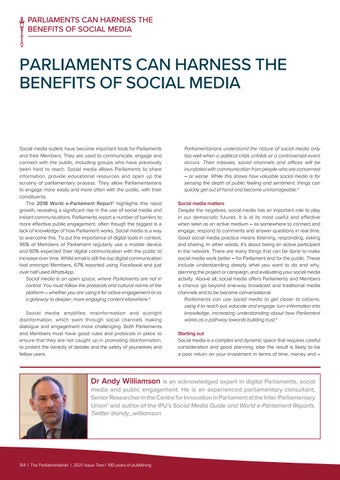PARLIAMENTS CAN HARNESS THE BENEFITS OF SOCIAL MEDIA
PARLIAMENTS CAN HARNESS THE BENEFITS OF SOCIAL MEDIA
Social media outlets have become important tools for Parliaments and their Members. They are used to communicate, engage and connect with the public, including groups who have previously been hard to reach. Social media allows Parliaments to share information, provide educational resources and open up the scrutiny of parliamentary process. They allow Parliamentarians to engage more easily and more often with the public, with their constituents. The 2018 World e-Parliament Report2 highlights this rapid growth, revealing a significant rise in the use of social media and instant communications. Parliaments report a number of barriers to more effective public engagement, often though the biggest is a lack of knowledge of how Parliament works. Social media is a way to overcome this. To put the importance of digital tools in context, 96% of Members of Parliament regularly use a mobile device and 80% expected their digital communication with the public to increase over time. Whilst email is still the top digital communication tool amongst Members, 67% reported using Facebook and just over half used WhatsApp. Social media is an open space, where Parliaments are not in control. You must follow the protocols and cultural norms of the platform – whether you are using it for active engagement or as a gateway to deeper, more engaging content elsewhere.2 Social media amplifies misinformation and outright disinformation, which swim through social channels making dialogue and engagement more challenging. Both Parliaments and Members must have good rules and protocols in place to ensure that they are not caught up in promoting disinformation, to protect the veracity of debate and the safety of yourselves and fellow users.
Parliamentarians understand the nature of social media only too well when a political crisis unfolds or a controversial event occurs. Their inboxes, social channels and offices will be inundated with communication from people who are concerned – or worse. While this shows how valuable social media is for sensing the depth of public feeling and sentiment, things can quickly get out of hand and become unmanageable.2 Social media matters Despite the negatives, social media has an important role to play in our democratic futures. It is at its most useful and effective when seen as an active medium – as somewhere to connect and engage, respond to comments and answer questions in real time. Good social media practice means listening, responding, asking and sharing. In other words, it’s about being an active participant in the network. There are many things that can be done to make social media work better – for Parliament and for the public. These include understanding deeply what you want to do and why, planning the project or campaign, and evaluating your social media activity. Above all, social media offers Parliaments and Members a chance go beyond one-way broadcast and traditional media channels and to be become conversational. Parliaments can use social media to get closer to citizens, using it to reach out, educate and engage: turn information into knowledge, increasing understanding about how Parliament works as a pathway towards building trust.2 Starting out Social media is a complex and dynamic space that requires careful consideration and good planning, else the result is likely to be a poor return on your investment in terms of time, money and –
Dr Andy Williamson is an acknowledged expert in digital Parliaments, social
media and public engagement. He is an experienced parliamentary consultant, Senior Researcher in the Centre for Innovation in Parliament at the Inter-Parliamentary Union1 and author of the IPU’s Social Media Guide and World e-Parliament Reports. Twitter @andy_williamson
154 | The Parliamentarian | 2021: Issue Two | 100 years of publishing






